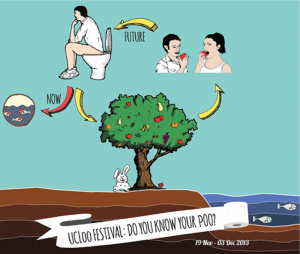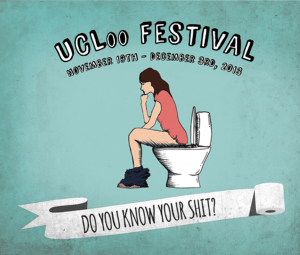Toilets – the unexpected issue
By Tse-Hui Teh, on 1 October 2013
I definitely did not expect to be talking about toilets; to anyone, at anytime. Not that it was a taboo topic, I just never identified it as an issue. I was never particularly scatological; I didn’t have a fear of flushing, and I never had a problem going. The queue for the ladies’ was probably my biggest concern until a few years ago. Then the toilet issue just grew.
I was researching the urban water-cycle. More particularly, how to equitably share and effectively use water resources throughout the community and the environment. Working in London, it was inevitable that I would quickly bump up against the toilet. About one-third of our daily water use goes down the toilet. Yes, one third – that’s approximately 50L of fresh, treated drinking water pumped directly to your point of use that is being used to move and dilute valuable fertilizer (your pee and poo). This is ludicrous and unbelievable in an age of sustainability, environmental protection, and shortages of both water and phosphorous.
But was it possible to change this? Were there any other outraged souls out there? Was anyone willing to change? And if so, how?
And that is how I started to talk about toilets.
It’s been an interesting journey so far. Waterborne sanitation is less entrenched that you might think. My research found that there were people in London who did care about their water consumption, but because the flushing toilet was so prevalent, they resourcefully altered their habits to encompass “yellow mellowing” to save water.
If you don’t know, the ditty is, “If it’s yellow, let it mellow. If it’s brown, flush it down.” I’m not sure where it started, the various urban myths are somewhere in California or Australia. In any case, it just means you only flush after a poo. What was strange for me is that more people did this than I expected. As I started talking to people, more of them ‘outed’ themselves as closet yellow mellowers. What a surprise!
The problem with “yellow mellowing” is that this is not seen as the proper way of using the flushing toilet. This is why “yellow mellowing” is usually done in the privacy of the home, and it is typical to run around and flush before having guests. This covert contradictory behaviour is not an optimal way of saving water, nor does it make it easier to harvest the nutrients from human waste as fertilizer.
Once you are on this line of thinking to save water and nutrients, most people see that the next logical step would be to make a non-flushing toilet system. This would make non-flushing the correct way to use the toilet because there is simply no flush to use. By not flushing, fertilizer could also easily be reclaimed.
This is amazing. These people, who use a waterborne sanitation system, thought it could be improved. The infrastructure is not as entrenched as I had imagined.
But this is not the end of the story. After this, the question is how would you collect the waste? It used to be the nightsoil man, but what would the alternative be in a contemporary city? Where would the collection points be? How would you effectively harvest the nutrients? Where would the fertilizer be distributed to? How would you stop it from smelling? How would you keep it hygienic? Who would manage it? How many people would need to change their toilet system to make this a viable option? Would other people also see it as a better option? What would make people change their toilet system when most people don’t even think about where the water comes from and where the waste goes? And a plethora more questions to be asked!
Your thoughts are greatly appreciated. What do you think it would take to change?
Have a say on the blog and come along to the UCLoo Festival, opening on World Toilet Day (19th November), to try out a vacuum flush toilet that only takes 200mL per flush, see some new prototype toilets and waste treatment systems, see how UCL researchers are answering some of these questions, and apply for the make-a-thon so that you can join in the creativity of answering some of the questions. Please also donate to UCLoo Festival – just £5 or less will help – to make sure this event happens: http://spacehive.com/ucloofestival2013 But hurry – we must reach our fundraising target by 17th October!
I look forward to hearing your thoughts and to seeing you at the UCLoo Festival!
 Close
Close



